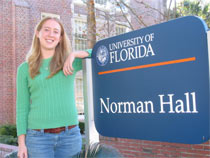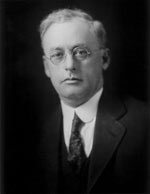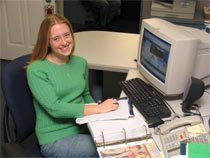Wendy Norman on James W. Norman
By WENDY NORMAN (UF 2008, B.A. in English)
Student assistant, UF College of Education
 Wendy Norman
Wendy Norman
Anwen “Wendy” Norman, 21, of Malabar, Fla., is a UF sophomore studying English and now works part-time in historic Norman Hall, named after her great-grandfather and former education dean.
“There was a man named Rosenthal, who kept a goat tied in a stall,” James William Norman would sing on family car trips.
“Daddy, that’s enough!” pleaded his three children. “We’ve heard it so many times!”
To his kids, he was Daddy. To his colleagues and students, he was Dr. James W. Norman, the third dean of the College of Education, from 1920-1941. To me he is just Pa, my great-grandfather.
Although he died in 1969 some 16 years before I was born, I grew up hearing about Pa. I knew he had been the education dean at UF and that Norman Hall, the campus home of the College of Education, was named after him. My little claim to fame always surprises people, especially now that I work at the College part-time as a student assistant while attending UF.
I knew that while my dad, James William Norman III (UF ’73, ’74) attended UF, he lived with “Pa,” as our family calls him, and my great-grandmother, Lucile, on Tuscawilla Avenue in the “duck pond area” of northeast Gainesville.
I knew that Pa was a woodworker at some point in his life and made a lot of the furniture that now sits in my grandmother’s house. I knew everyone in my family loved him very much.
But there was so much more to this man I never met.
James W. Norman was always passionate about academia, even while growing up on a farm called Shady Nook in Hartwell, Ga. When he graduated from high school, he thought his chance had come to venture into a new world of knowledge and discovery at a university. His father, William Benson Jefferson Norman, had other ideas.
“A year between the plow handles never hurt anybody,” said Pa’s father.
Pa was forced to stay home and work the farm for a year, frustrated that his deep desire to attend college was delayed.
“As soon as he got away to the university, he was gone from that life forever and into the life of academics,” my dad, James III, said.
Pa may have escaped a life of farming, but he still enjoyed the outdoors. In the winter he would chop firewood. It gave him a chance to be alone with his thoughts and exercise at the same time.
Pa loved anything that let him use his mind. He enjoyed puzzles, whether it was a geometric or a mathematical challenge. He loved playing games. His youngest child Sarah (my aunt) said that he always played to win, whether he was playing against a friend or a grandchild.
Pa used to play chess with my dad through the mail. My dad and my granddad, James William Norman Jr., would send letters to Pa containing a single move. After the match was finished, they found out Pa never once set up a chess board.
“He held it in his mind for months and whipped us!” my dad said.
Pa’s chess victory was evidence of his motto, “Do something supremely well.” My family remembers him saying that often. He challenged himself, his family, and his students to live by that motto.
 James W. Norman
James W. Norman
At age 56, he challenged himself to carve a chess set and in the process discovered a talent for woodworking. He carved beautiful furniture and dozens of grandfather clocks. One clock sits in my grandmother’s living room and another recently found its way back to Norman Hall in the College of Education dean’s conference room.
Pa was known for much more than being a great woodcarver. My dad remembers him as a man of “great gravity, great wisdom, and great mirth.”
When my dad was a freshman at UF in 1968 and living with Pa, he had to read books for an English class. Pa read them at the same time and then discussed them with his teenage grandson.
In response to The Great Gatsby, Pa said, “The seamy side of life! The seamy side of life! Why does everybody want to write about the seamy side of life?”
Pa was a devout, born-again Christian who lived far from the seamy side of life. The local Southern Baptist church was an important part of his life.
“He taught the old ladies’ Sunday School class as long as I can remember,” his oldest daughter Frances said.
My family tells me that Pa was pious, but not strict or severe. He was welcoming and inviting, a man who made you instantly comfortable in his presence. His children describe him as loving, cheerful, helpful and gentle.
“He was a very kind father,” Sarah said. “I had a good childhood.”
He loved watching his three children and nine grandchildren play. He was known to sit with that “Pa” smile on his face, laughing at their antics and taking pleasure in their fun.
Pa liked to know what was going on in the world but did not own a radio. When Calvin Coolidge was elected president, he took Frances to the Gainesville Sun office to watch the election results come in.
On Saturday nights he would take Frances with him to the local haberdashery store to see the ball game scores posted on the window.
Pa was an avid Gator football fan. After work at the College of Education he would head across campus to the football stadium and watch the team practice. His wife often joked that she was not going to have dinner for him if he stayed too late.
Pa knew he was watching a gridiron force to be reckoned with. FSU started a team and wanted to play the Gators. A lot of people did not want to play “that former girls’ school.” Pa reasoned that it could only help his beloved Gators.
“The day is going to come when they are our main rivals,” Pa said with a twinkle in his eye. “We should play them a whole lot now so that we can run up a lot of easy wins early.”
After retiring as dean, Pa stayed at his house on Tuscawilla Avenue and remained a devout Gator football fan. He went to Norman Hall everyday to get his mail, as he was Dean Emeritus and kept strong ties to the College. However, Pa would never call it Norman Hall. Modesty prompted him to refer to the building as the College of Education.
I wish I could have met my great-grandfather. Not only was he a great educator, but he was also just Pa, a man who loved God and his family and took delight in the small things in life.
“He was a very smart, intellectual person who nonetheless kept the common touch,” my dad said.
My first glimpse of his namesake came the summer before I arrived at UF. My mom wanted to see Norman Hall again and show me where so much family history resided.
We met Kay Hughes, then head of information and publication services, when we inquired about the display on Pa that used to be in the main hallway. She was excited to find out I was Dean Norman’s great-granddaughter, a reaction I get from most people affiliated with the College of Education when they discover our relation. At the time I was planning on majoring in journalism and Kay said to let her know if I was interested in a job.
 Wendy Norman
Wendy Norman
I applied for a student assistant position in the College’s newly renamed News and Publications office my sophomore year and was hired by the new director, Larry Lansford. I did not mention I was Dean Norman’s great-granddaughter, but Larry saw my last
name and put two-and-two together. Working in the building that shares my name is a special opportunity and has been exciting.
For three generations my family has been devoted to enriching their lives with knowledge gleaned from the University of Florida. With this proud heritage of education-loving Gators, I have grown up with the desire to attend the University of Florida and follow in my family’s footsteps as a fourth generation Gator. In the year the College of Education commemorates its 100th anniversary, I hope to “do something supremely well” at the place that Pa loved and my family has come to respect and cherish.
It’s great to be an Edugator. And it’s great to be a Norman, working and walking the halls that Dr. James William Norman—or, simply, Pa—used to patrol for so many years.
# # #




